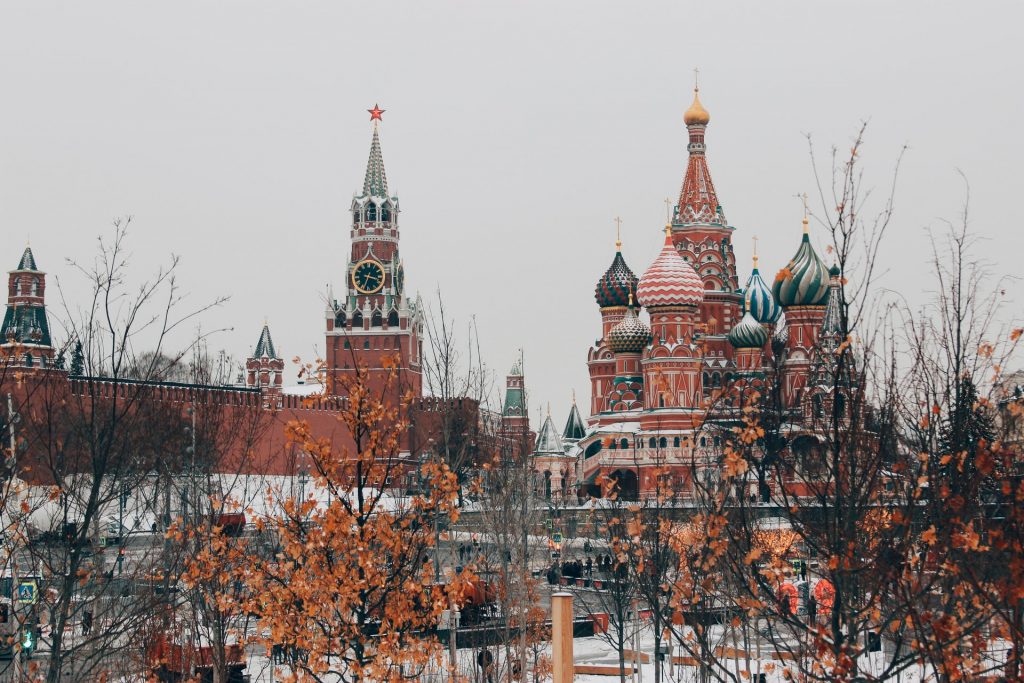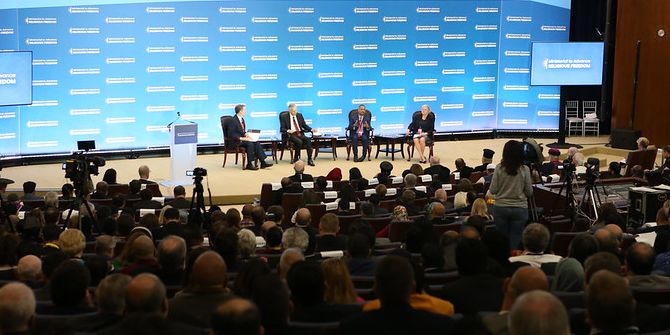The interplay between religion and politics is complicated. Whether a relationship of utility, power, or distraction, scholars have fiercely debated this relationship and its applicability around the world. Focusing on Russia specifically and based on his recent book, Dr Tobias Köllner writes about the entangled relationship between politicians and church leaders in the country and how it results in unintended consequences.

Since Gorbachev-era reforms in the 1980s, the Russian Federation has undergone tremendous reforms in the political and religious sectors. Russian Orthodoxy in particular, once severely persecuted and almost eliminated from the public sphere, has re-emerged and today plays a crucial – and political – role in Russian society.
Theoretically, a lot has been written on the contemporary relationship between religion and politics in terms such as secularism, secularity and secularization. But too many of these accounts begin from binary ‘theories’ and not from empirical observation of either religion or politics, and the relationship between Russian politicians and the Orthodox Church is complicated.
Weber’s differentiation between power and authority is crucial for understanding this relationship. For Weber, power was the appropriate concept used for understanding loose political structures where every decision could be contested easily; the notion of authority referred to more structured political situations characterized by a belief in the legitimacy of the rulers (traditional and charismatic authority) or in a structured process of decision-making (rational-legal authority). The key difference between power and authority rests in the idea of legitimacy. But to what extent can this binary be found in empirical data? I try to answer that question by taking a micro perspective on the interrelation between politics and Orthodoxy in contemporary Russia.
With that micro perspective, the notion of legitimacy in itself becomes problematic. Although the definition is eloquent and logically consistent, it has a problematic side effect. It leaves no room for other spheres of society to operate, except in relation to the political with its differentiation between power and authority. Therefore, within Weber’s framework, there exist only two ways for conceptualizing the relationship between religion and politics. One is that religion is a social force that provides legitimacy to political leaders. The second is that religion is understood as something that challenges the legitimacy of political leaders. The micro perspective presented here does not fall entirely within that binary.
Drawing on these findings, the relationship between politics and religion in contemporary Russia is complex and an open-ended process of cooperation, negotiation, contestation and confrontation between two powerful actors. In this interplay, neither side is able to instrumentalize the other completely or permanently.
Moreover, my analysis shows that neither Russian Orthodoxy nor Russian politics are to be regarded as uniform spheres. Relations between both exist at various levels of organizations, institutions and movements; local and regional, as well as national. Ethnographic field research, with its long-term stays and first-hand access, offers a good basis for documenting this complexity and for presenting the diversity, differences and disagreements within the two areas. Indeed, a strong focus on the regional and local levels, without ignoring events at the national level, is crucial. Misunderstandings, conflicts and competitive situations between Russian Orthodoxy and politics occur much more frequently ‘below the nation’, where hierarchies for resolving and enforcing interpretations are much rarer and weaker. Moreover, my research found that many initiatives are inspired or initiated at the national level, but only a small part of them are provided with the corresponding tactical support or the necessary financial resources to be realized. Accordingly, efforts at the local level are centrally mandated but rarely prepared or supported, relying on local initiative and improvisation.
At these local levels, it became obvious that Russian Orthodoxy and politics are deeply entangled but remain separate. Therefore the concept of ‘entangled authorities’ was developed to draw attention to the relation between both sides. Although an entanglement might look very much the same as the outcome of a close cooperation, the processes involved are complex, not straightforward, and include a great number of unintended results. Entanglements, thus, are not the glorious implementation of a well-thought-out plan but the result of social interactions, which might have had completely different goals and intentions.
To understand the ‘entangled authorities’ of contemporary Russian Orthodoxy and politics, there are three aspects to note:
- personal acquaintances and connections between individual actors from both fields,
- institutional connections between the two fields that have developed at the latest since the end of socialism and
- ideological convergences that can be derived, for example, from an emphasis of an ‘authentic Russian way’, an equation of Russian culture with Russian Orthodoxy and a rejection of the West – despite all the different classifications and evaluations of it.
My research shows close personal links between politicians at the local, regional and national levels and their counterparts at the equivalent level in the Russian Orthodox Church – priests and monks, bishops and archbishops – who are extensively consulted about political decisions. Often, this results in institutional entanglements when joint commissions, organizations or educational structures develop. Nevertheless, my research also outlines that, despite working closely together, there are many tensions between Russian politics and Orthodoxy. Therefore, it becomes clear that despite this close cooperation the outcomes of these interactions are not predetermined and quite often lead to unexpected or even unintended consequences.
An example of this entanglement between politics and religion in Russia – resulting in unintended consequences – is the introduction of religious education in state schools. After heated discussions, the initial idea of teaching ‘Orthodox Culture’ turned into something else: in 2009, the then-President Dmitrii Medvedev signed a Presidential Directive introducing a multi-confessional course called ‘Fundamentals of Religious Cultures and Secular Ethics’ (Osnovy religioznykh kul’tur i svetskoi etiki). In contrast to the initial goals of the Russian Orthodox Church and Orthodox activists, the teaching of religion was introduced as a non-evangelical subject. Nevertheless, clergymen tend to seize any opportunity for participation in lessons and other such events, such as the opening of the school year or the celebration of festive days. Sometimes this includes prayers and other religious practices, although such activities are officially forbidden. Personal relations, thus, play a crucial role for entering schools and today Russian Orthodoxy is mainly understood ‘culturologically’ with wider implications in the reorientation of the school system at large. In so doing, it includes issues such as morality, identity and patriotism.
Therefore, religious education in public schools might have been envisioned as a tool for further sustaining nation-building and legitimization by state authorities, but since it is quite regularly used for proselytization, it expands the apparent and intended role of the Church in the state. To sum my findings up, it is fair to say that the interactions between Orthodox religion and politics in contemporary Russia are manifold and characterized by a complex interplay of cooperation, competition, conflict and unintended consequences.
Note: This piece gives the views of the author, and not the position of the LSE Religion and Global Society blog, nor of the London School of Economics.





